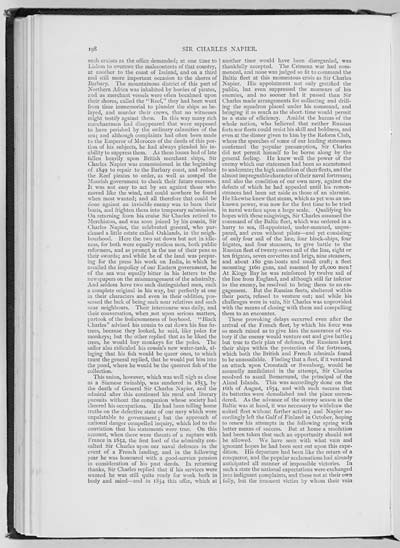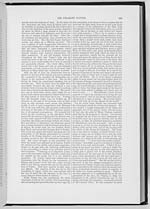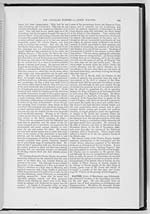198
such cruises as the office demanded; at one time to
Lisbon to overawe the malecontents of that country,
at another to the coast of Ireland, and on a third
and still more important occasion to the shores of
Barbary. The mountainous district of this part of
Northern Africa was inhabited by hordes of pirates,
and as merchant vessels were often becalmed upon
their shores, called the "Reef," they had been wont
from time immemorial to plunder the ships so be-
layed, and murder their crews, that no witnesses
might testify against them. In this way many rich
merchantmen had disappeared that were supposed
to have perished by the ordinary calamities of the
sea; and although complaints had often been made
to the Emperor of Morocco of the deeds of this por-
tion of his subjects, he had always pleaded his in-
ability to suppress them. As these losses had of late
fallen heavily upon British merchant ships, Sir
Charles Napier was commissioned in the beginning
of 1849 to repair to the Barbary coast, and reduce
the Reef pirates to order, as well as compel the
Moorish government to check their future excesses.
It was not easy to act by sea against those who
moved like the wind, and could nowhere be found
when most wanted; and all therefore that could be
done against an invisible enemy was to burn their
boats, and frighten them into temporary submission.
On returning from his cruise Sir Charles retired to
Merchiston, and was soon joined by his cousin, Sir
Charles Napier, the celebrated general, who pur-
chased a little estate called Oaklands, in the neigh-
bourhood. Here the two sat down but not in idle-
ness, for both were equally restless men, both public
reformers, and as prompt in the use of their pens as
their swords; and while he of the land was prepar-
ing for the press his work on India, in which he
assailed the impolicy of our Eastern government, he
of the sea was equally bitter in his letters to the
newspapers on the mismanagement of the admiralty.
And seldom have two such distinguished men, each
a complete original in his way, but perfectly at one
in their characters and even in their oddities, pos-
sessed the luck of being such near relatives and such
near neighbours. Their intercourse was daily, and
their conversation, when not upon serious matters,
partook of the frolicsomeness of boyhood. "Black
Charles" advised his cousin to cut down his fine fir-
trees, because they looked, he said, like poles for
monkeys; but the other replied that as he liked the
trees, he would buy monkeys for the poles. The
sailor also ridiculed his cousin's new water-tank, al-
leging that his fish would be queer ones, to which
taunt the general replied, that he would put him into
the pond, where he would be the queerest fish of the
collection.
This union, however, which was well nigh as close
as a Siamese twinship, was sundered in 1853, by
the death of General Sir Charles Napier, and the
admiral after this continued his rural and literary
pursuits without the companion whose society had
cheered his occupations. He had been telling home
truths on the defective state of our navy which were
unpalatable to government; but the approach of
national danger compelled inquiry, which led to the
conviction that his statements were true. On this
account, when there were threats of a rupture with
France in 1852, the first lord of the admiralty con-
sulted Sir Charles upon our naval defences in the
event of a French landing, and in the following
year he was honoured with a good-service pension
in consideration of his past deeds. In returning
thanks, Sir Charles replied that if his services were
wanted he was still quite ready for work both in
body and mind�and in 1854 this offer, which at
another tune would have been disregarded, was
thankfully accepted. The Crimean war had com-
menced, and none was judged so fit to command the
Baltic fleet at this momentous crisis as Sir Charles
Napier. His appointment not only gratified the
public, but even suppressed the murmurs of his
enemies, and no sooner had it passed than Sir
Charles made arrangements for collecting and drill-
ing the squadron placed under his command, and
bringing it as much as the short- time would permit
to a state of efficiency. Amidst the huzzas of the
whole nation, who believed that neither Russian
forts nor fleets could resist his skill and boldness, and
even at the dinner given to him by the Reform Club,
where the speeches of some of our leading statesmen
confirmed the popular presumption, Sir Charles
did not permit himself to be borne along by the
general feeling. He knew well the power of the
enemy which our statesmen had been so accustomed
to underrate; the high condition of their fleets, and the
almost impregnable character of their naval fortresses;
and also the condition of our own navy, against the
defects of which he had appealed until his remon-
strances had been set aside as those of an alarmist.
He likewise knew that steam, which as yet was an un-
known power, was now for the first time to be tried
in naval warfare upon a large scale. Qualifying his
hopes with these misgivings, Sir Charles assumed the
command of the Baltic fleet, which was ordered in a
hurry to sea, ill-appointed, under-manned, unpre-
pared, and even without pilots�and yet consisting
of only four sail of the line, four block-ships, four
frigates, and four steamers, to give battle to the
Russian fleet of twenty-seven sail of the line, eight or
ten frigates, seven corvettes and brigs, nine steamers,
and about 180 gun-boats and small craft; a fleet
mounting 3160 guns, and manned by 28,000 men!
At Kioge Bay he was reinforced by twelve sail of
the line from England, and although still far inferior
to the enemy, he resolved to bring them to an en-
gagement. But the Russian fleets, sheltered within
their ports, refused to venture out; and while his
challenges were in vain, Sir Charles was unprovided
with the means of closing with them and compelling
them to an encounter.
These provoking delays occurred even after the
arrival of the French fleet, by which his force was
so much raised as to give him the assurance of vic-
tory if the enemy would venture out and give battle ;
but true to their plan of defence, the Russians kept
their ships within the protection of the fortresses,
which both the British and French admirals found
to be unassailable. Finding that a fleet, if it ventured
an attack upon Cronstadt or Sweaborg, would be
assuredly annihilated in the attempt, Sir Charles
resolved to assail Bomarsund, the principal of the
Aland Islands. This was accordingly done on the
16th of August, 1854, and with such success that
its batteries were demolished and the place surren-
dered. As the advance of the stormy season in the
Baltic was at hand, it was necessary to withdraw the
united fleet without further action; and Napier ac-
cordingly left the Gulf of Finland in October, hoping
to renew his attempts in the following spring with
better means of success. But at home a resolution
had been taken that such an opportunity should not
be allowed. We have seen with what vain and
ignorant hopes he had been sent out upon this expe-
dition. His departure had been like the return of a
conqueror, and the popular acclamations had already
anticipated all manner of impossible victories. In
such a state the national expectations were exchanged
into indignant complaints, and these not at their own
folly, but the innocent victim by whom their vain

![]() Universal Viewer |
Universal Viewer | ![]() Mirador |
Large image | Transcription
Mirador |
Large image | Transcription
![]()

